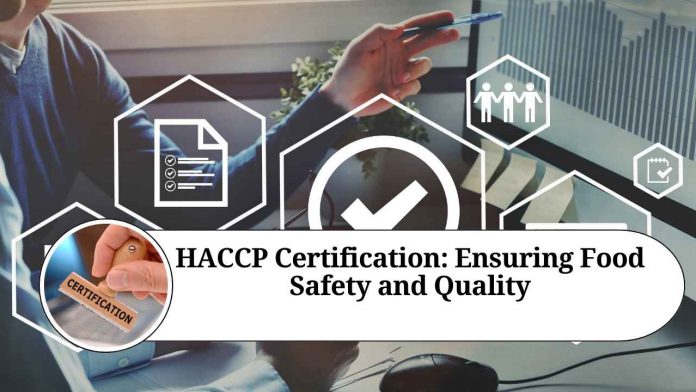HACCP (Hazard Analysis and Critical Control Points) is a systematic approach to identify, evaluate, and control potential hazards that may cause harm to consumers or pose a threat to food safety. HACCP is widely recognized as an effective means of controlling food safety hazards and is used by food manufacturers, processors, and distributors to ensure the safety of their products.
HACCP certification is a process by which an organization demonstrates that it has implemented an effective HACCP plan. This certification is a third-party endorsement of the organization’s commitment to food safety and its ability to produce safe food products. HACCP certification can provide several benefits to organizations, including increased customer confidence, improved market access, and compliance with regulatory requirements.
The HACCP certification process typically involves the following steps:
- Development of a HACCP plan: The organization must develop a HACCP plan that identifies potential hazards and critical control points (CCPs) where these hazards can be controlled or eliminated.
- Implementation of the HACCP plan: The organization must implement the HACCP plan and train its employees on the procedures and protocols specified in the plan.
- Verification and validation of the HACCP plan: The organization must regularly verify and validate the HACCP plan to ensure that it remains effective and up-to-date.
- Audit and certification: The organization must undergo an audit by an accredited third-party certification body to assess compliance with the HACCP requirements. If the organization meets the requirements, it will be awarded HACCP certification.
HACCP certification is typically awarded for a specified period, after which the organization must undergo a recertification audit to maintain its certification.
There are several benefits to obtaining HACCP certification. Firstly, it can increase consumer confidence in the safety of the organization’s products. By demonstrating a commitment to food safety and implementing an effective HACCP plan, organizations can differentiate themselves from competitors and attract customers who prioritize food safety.
Secondly, HACCP certification can improve market access. Many retailers and food service providers require their suppliers to be HACCP certified, and obtaining certification can open up new business opportunities for organizations.
Finally, HACCP certification can help organizations comply with regulatory requirements. In many countries, food manufacturers and processors are required to implement a HACCP plan as part of their food safety management system. By obtaining HACCP certification, organizations can demonstrate compliance with these requirements and avoid potential legal and financial penalties.
conclusion
HACCP certification is a valuable tool for organizations that produce, process, or distribute food products. By implementing an effective HACCP plan and undergoing a third-party audit, organizations can demonstrate their commitment to food safety and gain a competitive advantage in the marketplace.
Other Related Blogs: Section 144B Income Tax Act
Frequently Asked Questions (FAQs)
Q: What is HACCP certification?
A: HACCP certification is a third-party endorsement that an organization has implemented an effective Hazard Analysis and Critical Control Points (HACCP) plan for food safety management.
Q: Why is HACCP certification important?
A: HACCP certification is important because it demonstrates an organization’s commitment to food safety and their ability to produce safe food products. It can increase consumer confidence, improve market access, and help organizations comply with regulatory requirements.
Q: Who can obtain HACCP certification?
A: Any organization that produces, processes, or distributes food products can obtain HACCP certification.
Q: What are the steps involved in obtaining HACCP certification?
A: The steps involved in obtaining HACCP certification typically include developing a HACCP plan, implementing the plan, verifying and validating the plan, and undergoing an audit by a third-party certification body.
Q: How long does HACCP certification last?
A: HACCP certification is typically awarded for a specified period, which can vary depending on the certification body. After this period, the organization must undergo a recertification audit to maintain its certification.
Q: What are the benefits of HACCP certification?
A: The benefits of HACCP certification include increased consumer confidence, improved market access, and compliance with regulatory requirements.
Q: How can an organization prepare for HACCP certification?
A: Organizations can prepare for HACCP certification by developing a HACCP plan, implementing the plan, and conducting internal audits to ensure compliance. They can also seek guidance from a HACCP consultant or attend HACCP training courses.
Q: What are the costs associated with HACCP certification?
A: The costs associated with HACCP certification can vary depending on the certification body, the size of the organization, and the complexity of the HACCP plan. Organizations should expect to pay fees for auditing, certification, and ongoing maintenance of their HACCP plan.
Q: Is HACCP certification mandatory?
A: HACCP certification is not mandatory in all countries, but many regulatory bodies and customers require organizations to have a HACCP plan as part of their food safety management system. Obtaining HACCP certification can help organizations comply with these requirements and avoid potential legal and financial penalties.




















